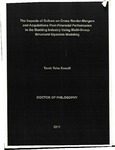The Impacts of Culture on Cross-Border Mergers and Acquisitions Post-Financial Performance in the Banking Industry using Multi-Group Structural Equation Modeling
| dc.contributor.author | Kandil, Tarek | |
| dc.contributor.other | Plymouth Business School | en_US |
| dc.date.accessioned | 2011-08-19T09:06:09Z | |
| dc.date.available | 2011-08-19T09:06:09Z | |
| dc.date.issued | 2011 | |
| dc.identifier | 101012776 | en_US |
| dc.identifier.uri | http://hdl.handle.net/10026.1/537 | |
| dc.description.abstract |
This thesis is concerned with the impacts of national culture on the cross-border-mergers and acquisitions performance in the banking industry across Egypt and UK through studying the role of the human side as a mediator variable. The main conceptual framework has been developed based on the GLOBE cultural project. It perceives the national culture as a multi-dimensional construct that interacts between levels. The thesis consists of a mixed methods approach which investigated international mergers and acquisitions by banks in Egypt and the UK from 2004 to 2007. The data collection process was carried out between June 2008 and November 2009 and was divided into three Phases: 1) desk research on the Egyptian and British banking industries; 2) 6 interviews with middle managers in both countries, and 3) (876) returned questionnaires (in Egypt and in the UK) of three mediating multi-sample groups (middle managers, employees and customers). The data analysis process involves analysing the case studies using pattern-coding, triangulation data methods and two distinct statistical methods: multiple regression analysis and multi-group structural equation modelling to test the hypothesised models. The analysis techniques used examined the significance of the differences of the two national cultures and their impacts on cross-border banks. For purposes of quantitative testing of bank-level cross-border MERGERS AND ACQUISITIONS post performance was examined using two distinct multi-dimensional constructs: between multi-group (middle managers, employees and customers) and within groups (the two nations). The findings seem to suggest that post-MERGERS AND ACQUISITIONS performance in the banking industry across nations has been influenced by very distinguishable cross-cultural leadership behaviours in each country. The findings of the qualitative and quantitative data analysis are consistent. The multiple regression findings indicate that the impact of v cultural distance on cross border acquisition performance varies with the level of post-acquisition integration, with cultural distance reducing performance to a larger extent at high levels of integration. These findings are consistent with previous researchers. However, in the Egyptian banking sample, the impact on the Egyptian leadership style has more positive impacts of the Egyptian shared understanding vales of Egyptian banking staffs than the British banking leaders. On the other hand, the British leaders, in the British banking sample, show a strong interaction between banking managers and employees, and between the leadership and the perceived services quality of the British customers. The multi-dimensional cultural interface developed from the literature has been supported by the findings of the research. It shows the complex interactions of national culture on the post-cross-border MERGERS AND ACQUISITIONS financial performance in banking industry. The thesis suggests that by charting the culture-financial performance relationship, it may be possible to anticipate certain behavioural patterns of leaders, employees and customers for each country. | en_US |
| dc.language.iso | en | en_US |
| dc.publisher | University of Plymouth | en_US |
| dc.title | The Impacts of Culture on Cross-Border Mergers and Acquisitions Post-Financial Performance in the Banking Industry using Multi-Group Structural Equation Modeling | en_US |
| dc.type | Thesis | |
| dc.identifier.doi | http://dx.doi.org/10.24382/4142 | |
| dc.identifier.doi | http://dx.doi.org/10.24382/4142 |
Files in this item
This item appears in the following Collection(s)
-
01 Research Theses Main Collection
Research Theses Main


